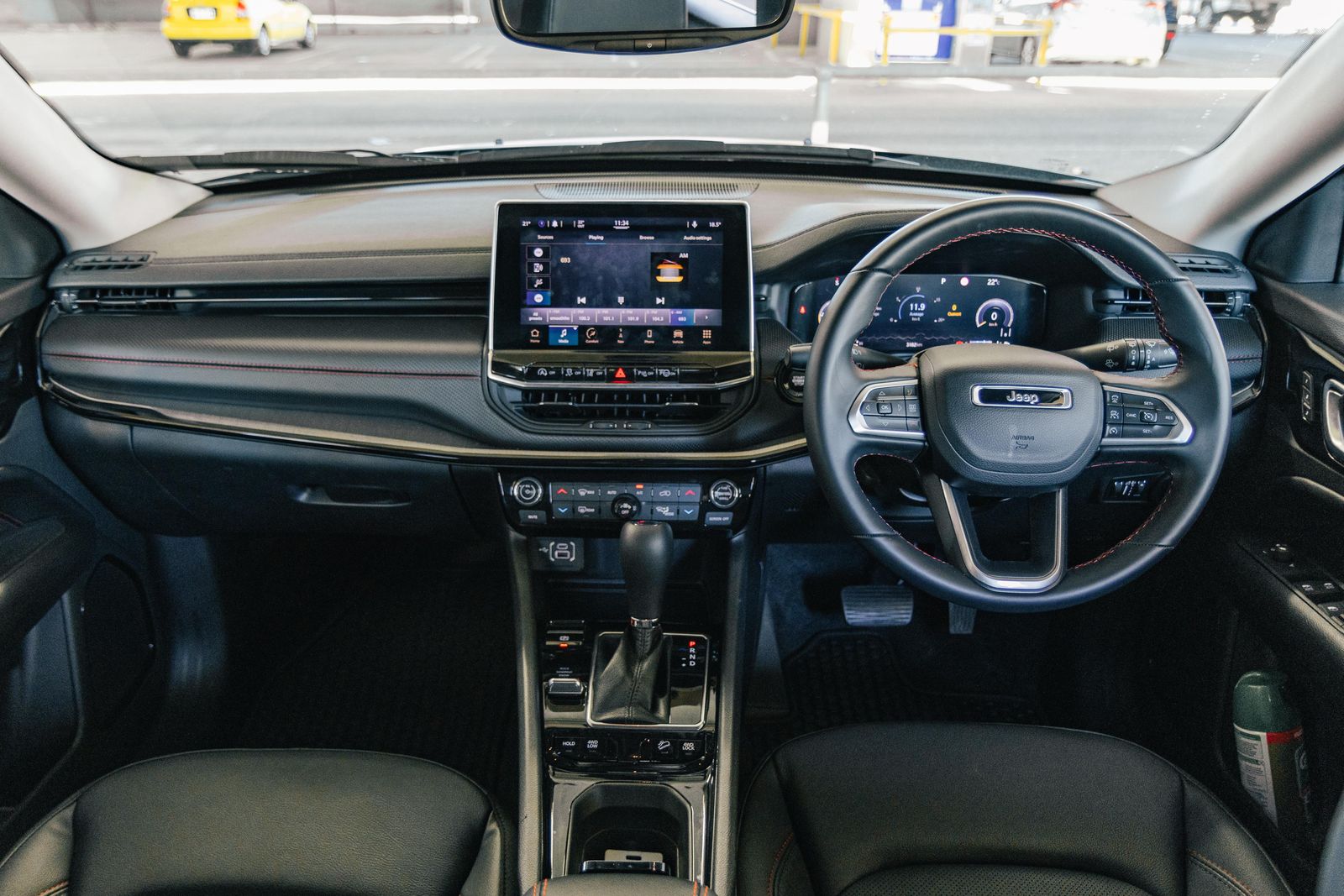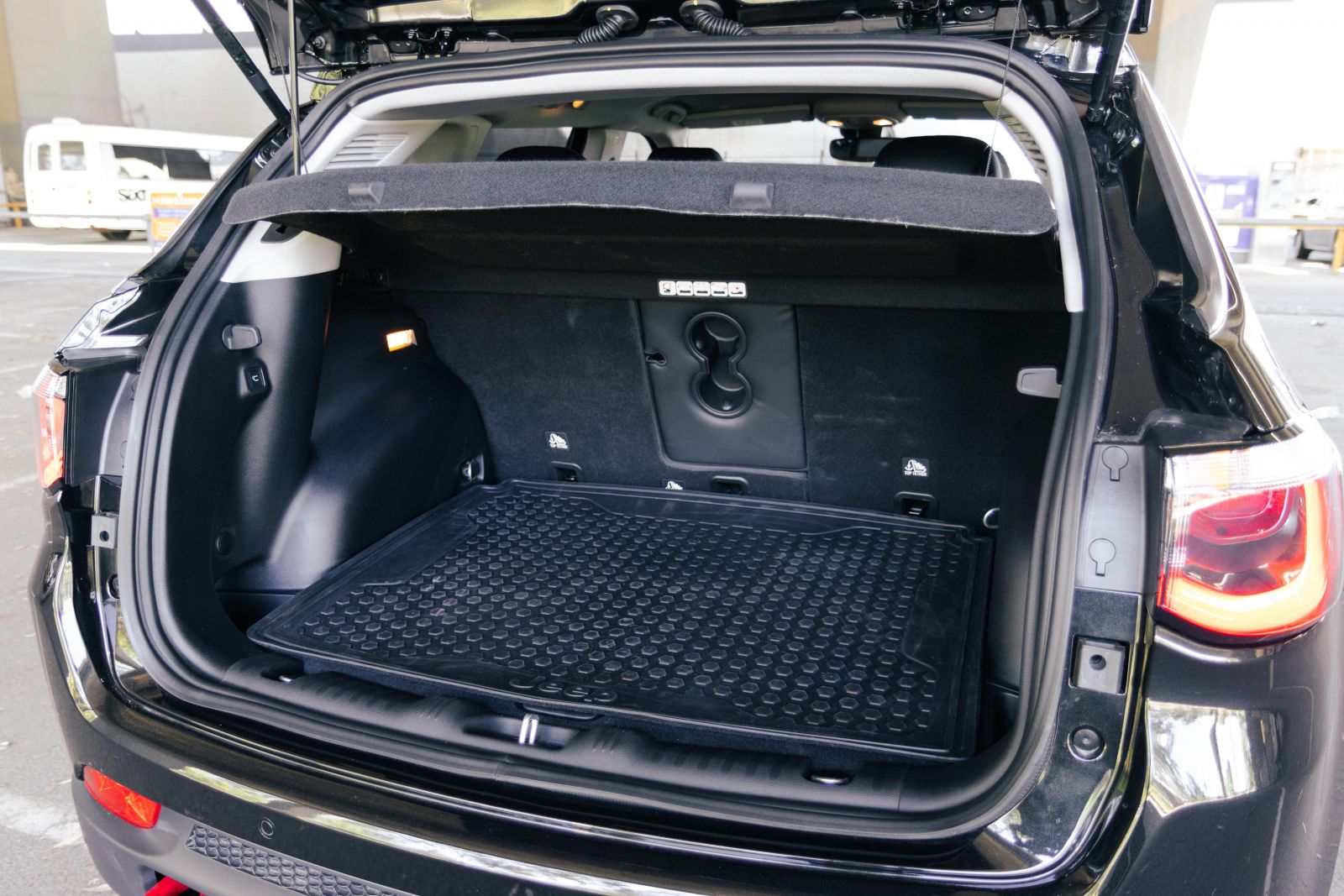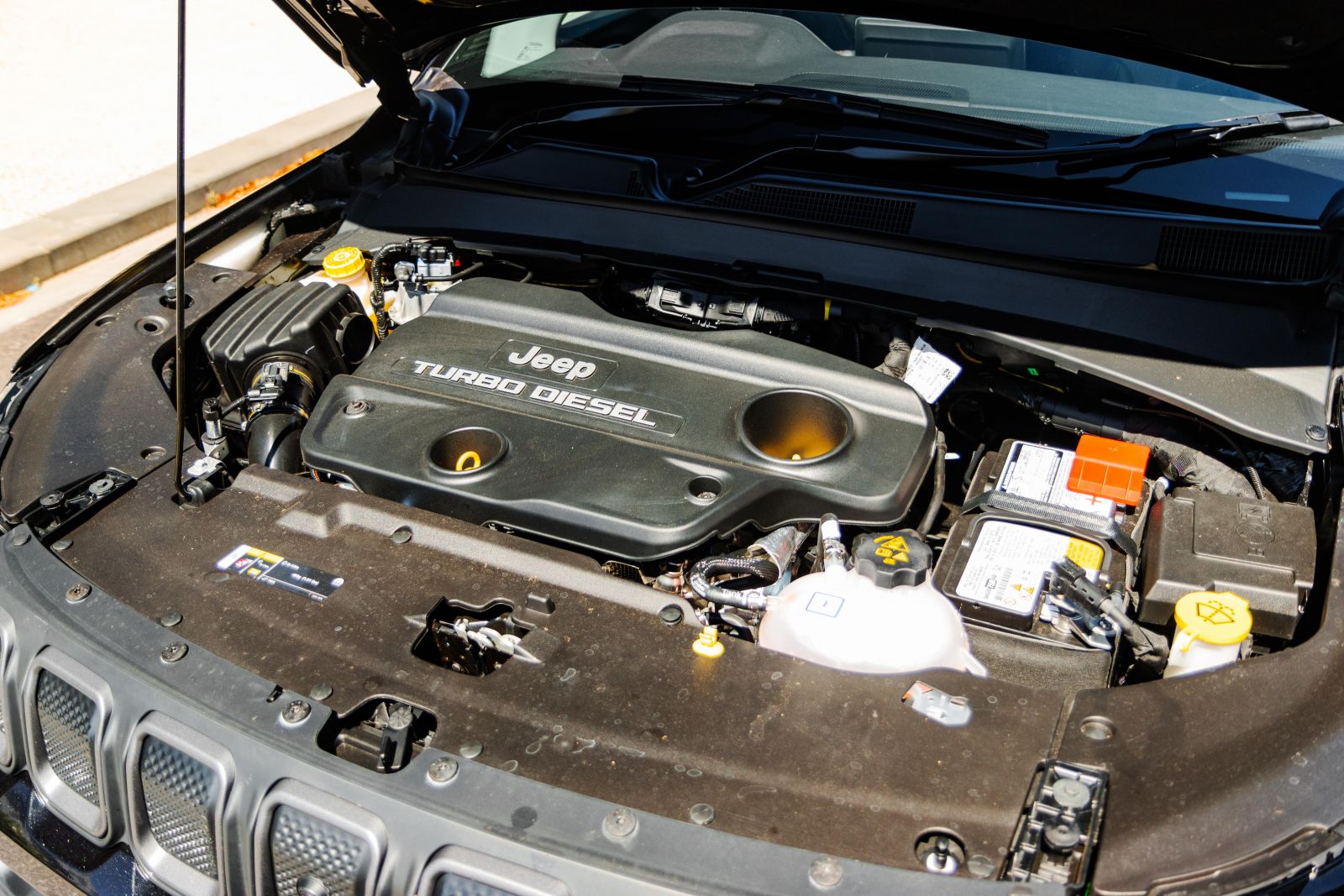The Indian-made, current-generation Jeep Compass small SUV has been on sale in Australia since 2017, and received a mid-life update in 2021 which brought a fresher look and more technology.
For 2023 the Compass range has received a few more specification tweaks.
The flagship Trailhawk on test was a MY22 example, but updated versions get a dual-pane sunroof, nine-speaker Alpine sound system, heated steering wheel, and heated and ventilated front seats.
The Compass range also received a price rise for 2023, with the flagship Trailhawk getting hit the hardest. It’s now $5100 more expensive than before, and starts at $59,100 before on-road costs.
The top-spec Compass Trailhawk can be distinguished by its lifted ride height, 17-inch diamond-cut alloy wheels with highway-terrain tyres, and the iconic “Trail Rated” badge. There’s also a number of tough-looking exterior styling elements.
In a hotly-contested segment, does the off-road-oriented Compass Trailhawk manage to set itself apart?
How much does the Jeep Compass Trailhawk cost?
The Jeep Compass Trailhawk is the flagship variant in the range and currently starts at $59,100 before on-road costs, following a recent $5100 price rise.
Our tester was finished in Brilliant Black pearl paint which costs an additional $895. This brings the total to $59,995 before on-road costs, or $60,201 drive-away for Victorian buyers (each state has slightly different taxes).
For 2023 the Premium Package ($4195 previously) is now standard, which includes a dual-pane panoramic sunroof, nine-speaker Alpine sound system, heated steering wheel, as well as heated and ventilated front seats.
It also receives a shark fin antenna instead of a removable short mast antenna, a black headliner instead of grey, Highway Assist which is a combination of adaptive cruise control and lane centring, as well as rear seat reminders.
2023 Jeep Compass pricing:
- Jeep Compass Night Eagle FWD: $41,400
- Jeep Compass Limited AWD: $47,700
- Jeep Compass S-Limited AWD: $54,300
- Jeep Compass Trailhawk: $59,100
Prices are before on-road costs
The Compass Trailhawk doesn’t really have any direct rivals as it straddles both the small and mid-size SUV segments in terms of size and price, but its closest competitor with some form of off-road capability is the Subaru Forester.
In 2.5i-S guise, which is the top-spec non-hybrid, it starts at $49,340 before on-road costs. This is $10,000 cheaper than the Compass Trailhawk.
There are also a number of medium SUVs available with a turbo-diesel engine, though options are waning.
Rivals include:
Prices are before on-road costs.
What is the Jeep Compass Trailhawk like on the inside?
The Jeep Compass Trailhawk is the toughest-looking variant in the range, and this is reflected with how the company has decked it out on the inside.
Hopping in one of the first things you’ll see besides the rubber floor mats are the black perforated leather seats that have Trailhawk embroidered with red stitching.
The front seats both have electric adjustability with lumbar support which allows you to dial in an almost-perfect seating position. Despite this, you can’t escape how the firm the seat base is.
The front seats are fine for shorter trips, but on longer trips they can get quite uncomfortable. I found myself having to shuffle how I sat a number of times in order to regain feeling in my butt.
Although it’s not present in our tester, MY23 versions of the Compass receive both heated and ventilated front seats. This is well received in a car that’s now over $60,000 drive-away.
Ahead of the driver is a 10.25-inch digital instrument cluster that on paper sounds great but in practice could ultimately be replaced by analogue dials and a small TFT display.
This digital instrument cluster has two different layouts, with both of them having large sections of blank space. I used the layout that looks like two traditional circular dials because it appeared to use more of the screen than the other layout.
In the middle of digital instrument cluster are a large number of pages that can be cycled through. You can also adjust a lot settings using the spongey push-buttons on the steering wheel.
Speaking of the steering wheel, it’s a chunky unit that has comfortable spots to rest your hands. It’s also heated for MY23 versions which is to be expected given the price.
As noted above, the front-facing steering wheel buttons are little spongey to use.
One thing that isn’t obvious at first glance are the additional buttons on the back of the steering wheel that adjust things like the volume and the radio station. If you aren’t aware of these buttons and aren’t shown that they exist, you won’t know they’re there…
Between the steering wheel and the digital instrument cluster are some of the cheapest-feeling indicator and wiper stalks I’ve ever used. They’re extremely bulbous in shape and have an brittle action. This isn’t something I expect to see in a $60,000 car.
Moving across is a 10.1-inch touchscreen infotainment system that has an almost square aspect ratio and is running the company’s Uconnect 5 software.
The display itself appears to be a high resolution and could arguably be the Compass’ best interior feature. It also packs a fair amount of power, which means the system boots quickly and loading new pages feels snappy.
Interacting with the touchscreen with swiping actions feels fluid and natural, though the display is an absolute fingerprint magnet. Just like the front-facing steering wheel buttons, thankfully these marks can be wiped away easily.
Both Apple CarPlay and Android Auto are available in wireless form and work well without any major dropout issues. There’s also a wireless phone charger which is nice to have given how power-hungry these smartphone mirroring apps can be.
The entire Compass range comes with satellite navigation as standard which is extremely easy to use and operate. I don’t typically use built-in satellite navigation systems but this is one of the best versions I’ve used to date. I’d still stick to using Google Maps or something of that ilk with smartphone mirroring just for convenience though.
Under the touchscreen are a set of physical push buttons and knobs for the climate control and volume that are great to see amid many carmakers making them touch-sensitive buttons or hiding them in a touchscreen menu.
There are a number of squishy soft-touch materials around the cabin in higher areas like the door armrest, centre console, and dashboard. You don’t need to look far though to find some really cheap-feeling plastics, which is to be expected.
There’s an extensive use of piano black along the centre tunnel, which is frustrating because it got dusty and grimy after a week. Thankfully piano black isn’t everywhere, which something I can’t say for some of the Compass’ rivals.
In terms of storage up front there are two decently-sized cupholders, as well as a handy phone holder between them. The centre console is adequate in terms of capacity but the armrest is too small for two elbows to rest on it comfortably.
Moving to the second row you’ll find the seats are even harder than the front. The headrests are rock hard too.
At a leggy 182cm I have enough space to sit comfortably behind my own driving position. Legroom, headroom and toe room aren’t necessarily amazing, but aren’t too compromised either.
What makes up for the hard rear seats are the amount of amenities there are. These include a flip-down centre armrest with cupholders, air vents on the back of the centre console, USB-A and USB-C outlets, as well as a proper 230V power outlet.
MY23 versions of the Compass Trailhawk also receive a dual-pane panoramic glass sunroof which is something that should’ve been standard on our MY22 tester.
The Compass Trailhawk comes with a hands-free tailgate as standard that can be operated by a kick under the rear bumper. There are also buttons to open/close it up front where a sunglasses holder would typically be, as well as on the left-hand side of the boot.
Jeep doesn’t quote a boot capacity figure for the Compass but it’s not overly large or too small. Goldilocks would approve. There are also handy sections off to the side that can be used to stow items prone to rolling around.
Thankfully the Compass Trailhawk comes with a full-size spare wheel unlike lesser variants which get a space-saver spare instead. A full-size spare wheel is critical in a vehicle that’s pitched as an off-road-ready package.
What’s under the bonnet?
The Jeep Compass Trailhawk is powered by a 2.0-litre four-cylinder turbo-diesel producing 125kW of power and 350Nm of torque.
This is mated to a nine-speed automatic transmission with drive sent through an all-wheel drive system. There’s are 4WD Low and a 4WD Lock settings, on top off Auto, Snow, Sand/Mud, and Rock drive modes.
Jeep claims the Compass Trailhawk can do the 0-100km/h sprint time in 9.7 seconds.
The rest of the local Compass range is currently powered by a 2.4-litre naturally-aspirated four-cylinder petrol engine with 129kW and 229Nm.
The entry-level front-wheel model is mated with a six-speed automatic, whereas the rest of the range comes with a nine-speed auto like the Trailhawk.
Claimed combined fuel economy for the Compass Trailhawk is 6.9 litres per 100km, though during our time we saw an average of 8.6 litres per 100km.
It has a 60-litre fuel tank and also uses AdBlue.
How does the Jeep Compass Trailhawk drive?
Starting up the Jeep Compass Trailhawk you’ll be greeted with a gruff and agricultural clatter from the four-cylinder turbo-diesel engine.
In some ways it reminds me of my family’s John Deere 7810 front-end-loader tractor that’s roughly the same age as me.
From a standstill there’s enough power and torque to get you moving. You definitely won’t be winning any races at the lights, but you’ll be keeping up with traffic just fine.
Around the city and in urban environments the Compass Trailhawk feels a little out of its element. This makes complete sense in a vehicle that’s geared more towards off-roading.
The steering in low-speed scenarios is heavy and it feels like you’re driving something larger than a small SUV. You’ll also be doing a lot of three-point turns because the turning circle isn’t the tightest.
The car comes with an engine stop-start system that’s meant to engage when idling. I couldn’t get this to activate at any point during my time with our tester which is a little disappointing.
When driving, the nine-speed automatic transmission can get a little bit confused. It feels like it has too many gears to choose from and hunts around aimlessly. The engine also revs uncharacteristically high when straightening up from a corner.
The transmission does eventually gets its mind into gear but it’s not a quick process.
Despite these downfalls, the Compass Trailhawk’s ride quality in both urban and rural scenarios is compliant and comfortable. I put this down to the smaller 17-inch alloy wheels and the Falken highway-terrain tyres with plenty of sidewall.
When you dial up the speed in the Compass Trailhawk things start to get quite loud. This is due in part to tyre roar from those chunky highway-terrain tyres.
At 50km/h and above you start to feel and hear the limits of the turbo-diesel engine as it revs high to squeeze out as much power as it can. This is most evident when you go to overtake.
There were also a number of annoying squeaks that developed around the cabin on our tester and were most noticeable at high speeds.
In terms of off-roading the Compass Trailhawk is fully loaded. There’s a 4WD Low mode that uses the existing gearing and simulates low-range gearing like the previous-generation Volkswagen Amarok, as well as a 4WD Lock mode that distributes torque to the front and rear wheels 50:50.
There are also a number of off-road drive modes that can be adjusted using a premium-looking knurled switch next to the gear selector.
During our SUV off-road mega-test last year, the Compass Trailhawk bared some surprising results.
Overall the car performed adequately off-road thanks to its 225mm of ground clearance, and felt comfortable when put in situations where there was a lot of wheel articulation.
The most notable result was how the doors struggled to open and close properly on the offset moguls, signifying there’s a lot of flex in the chassis. The Compass Trailhawk was the only car on test that struggled with this particular test.
The car also threw up error messages when the all-wheel drive was put under stress when taking off on a steep slope with slippery wooden logs. A number of other SUVs on test had the same thing happen as well, though.
On the assistance front, the Compass Trailhawk’s adaptive cruise control system largely works as it should but loves to put on the brakes if it detects a car in front of you. This makes the driving experience feel a bit unnatural.
The lane-keep assist likes to tug on the wheel quite strongly too, which is good when it’s sending you in the correct direction and annoying when it sends you in the wrong direction. The latter only really happens on roads with poor lane markings and is prevalent on a number of other cars on the market.
It’s worth noting that MY23 versions of the Compass Trailhawk gain Highway Assist, which combines adaptive cruise control and lane centring to facilitate semi-autonomous highway driving.
What do you get?
Compass Trailhawk highlights:
Exterior
- 17-inch diamond-cut alloy wheels
- Full-size spare wheel
- Falken all-season tyres
- Automatic LED projector headlights
- Automatic high-beam
- LED tail lights
- LED fog lights
- Rain-sensing window wipers
- Panoramic glass sunroof
- Privacy glass
- Black-painted roof
- Black bonnet decal
- Red recovery hooks
- 4 x exterior skid plates
- Off-road suspension
- Hands-free powered tailgate
- Power-folding, heated side mirrors
- Shark fin antenna
Interior
- 10.25-inch digital instrument cluster
- 10.1-inch touchscreen infotainment system
- Wireless Apple CarPlay, Android Auto
- DAB+ digital radio
- Satellite navigation
- 9-speaker Alpine sound system
- Wireless phone charger
- First- and second-row USB-A and USB-C ports
- 230V power outlet
- Dual-zone climate control
- Keyless entry and push-button start
- Remote start
- Electric park brake
- Leather-wrapped gear selector
- Heated steering wheel
- Black headliner
- Leather upholstery
- Heated and ventilated front seats
- 8-way power front seats with 4-way lumbar
- Driver’s seat memory
Is the Jeep Compass Trailhawk safe?
The Jeep Compass has a five-star ANCAP safety rating based on testing conducted in 2017 against older criteria.
That rating was based on a frontal offset score of 14.93 out of 16 and a side impact score of 16 out of 16. Whiplash and pedestrian protection were both rated Good.
Standard safety equipment includes:
- Autonomous emergency braking (AEB)
- Blind-spot monitoring
- Rear cross-traffic alert
- Lane departure warning
- Lane keep assist
- Traffic sign recognition
- Driver attention monitoring
- Intelligent speed assist
- Adaptive cruise control with stop/go
- Rear parking sensors
- Reversing camera
- Tyre pressure monitoring
- Front, rear seatbelt reminders
Stepping up to the Limited and above gets you front parking sensors, and parallel and perpendicular park assist.
The S-Limited and above adds a surround-view camera and Highway Assist, which is a combination of adaptive cruise control and lane centring.
How much does the Jeep Compass Trailhawk cost to run?
The Compass, like all new Jeep models, are covered by a five-year, 100,000km warranty.
Owners also receive lifetime roadside assist if they service their Compass through Jeep dealerships.
Logbook servicing for all petrol models is required every 12 months or 12,000km, whichever comes first, whereas the Trailhawk requires servicing every 12 months or 20,00km.
The first five services on all petrol variants is capped at $349, whereas for the Trailhawk they are $399.
CarExpert’s Take on the Jeep Compass Trailhawk
The Jeep Compass Trailhawk is the most obscure version of an already obscure and forgettable car.
It straddles both the small and medium SUV segments in terms of both size and price, and doesn’t really have any direct rival.
Jeep has tried its best to put the tried-and-tested “Trail Rated” stamp on the Compass Trailhawk, but I’m still not 100 per cent convinced it can perform flawlessly off-road given its performance at our SUV off-road mega-test.
Instead it feels like Jeep has thrown everything and the kitchen sink into how tough and off-road-ready it can make the Compass Trailhawk look.
I do appreciate that Jeep has given the Compass Trailhawk some additional standard equipment for 2023, but seeing it also received a price hike pushing it beyond the $60,000 drive-away threshold it makes it hard to recommend.
If you’re absolutely deadset on buying on Jeep Compass, the pick of the range would likely be the S-Limited as it’s cheaper, more luxury-focused, and also received a bunch of new standard features for 2023.
I’d also highly suggest you give some other small and medium SUVs a test drive too.
Click the images for the full gallery
MORE: Everything Jeep Compass

























